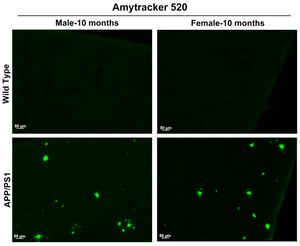
Alzheimer's disease (AD) affects women more than men. However, we don’t really know why. Women tend to live longer, which may contribute to a higher incidence of AD, but other factors, such as hormonal changes during menopause, could also influence disease progression.
In a study, published in Translational Psychiatry, researchers from the Centre for Brain Research in Bangalore explored why females exhibit a delayed onset of AD-related cognitive impairments how hormonal changes impact this progression.
The researchers used male and female APP/PS1 transgenic mice which present with an AD phenotype relatively early in life to examine how synaptic protein translation changes over time in response to AD pathology. They also explored the role of estrogen in protecting against cognitive decline, by removing the ovaries from some of the female mice leading to abolished estrogen production. They used Amytracker 520 to track and compare the accumulation of amyloid plaques, a hallmark of AD, in male and female mice.
Interestingly, the researchers found that females with intact ovaries show slower cognitive decline, suggesting that estrogen plays a neuroprotective role. To support these assumptions, they analysed human data to assess sex differences in cognitive decline among people with familial AD and found that AD risk increases in women with menopause-related hormonal changes.
Image: Amytracker 520 (in green) selectively stains Aβ plaques in the brains of 10-month-old APP/PS1 mice, but shows no staining in wild-type mice. Image from Supplementary Figure 4 by Kommaddi, R.P. et al. (2023) Translational Psychiatry, 13, 123 (CC BY 4.0).
